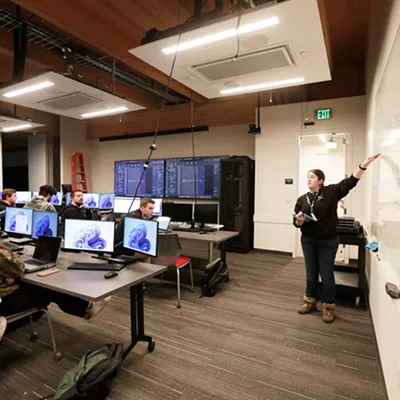
Last week, Eastern Washington University's Board of Trustees completed the university's more than two-year "strategic resource allocation" process, voting unanimously to eliminate five majors and two minors, which joined a list of dozens of cuts already agreed to by various departments.
In total, Eastern cut 45 undergraduate degrees, 10 graduate degrees, and 34 minors or certificates following the strategic process.
During their regular meeting on Friday, Feb. 28, at university President Shari McMahan's recommendation, the trustees eliminated minors in French and German, as well as majors in technical communication, physics (both general and professional), education studies, and education in physics - secondary. Students currently declared in each program will be able to finish their studies.
The seven programs were among 20 that university leadership and faculty did not reach an agreement on after the strategic resource allocation process sorted all 402 academic programs into five categories: invest, maintain, streamline, transform or disinvest.
McMahan's recommendation echoed that of university Provost Jonathan Anderson, who told the trustees on Friday that he ultimately reached an agreement with the Faculty Organization on most of the remaining cuts and programmatic changes within the list of 20. They disagreed on two of his proposed cuts: the elimination of the Bachelor of Arts in technical communication and the professional Bachelor of Science in physics.
The Faculty Organization, an academic senate made up of faculty members who get to weigh in on academic changes, specifically recommended maintaining the BS in physics. A program review committee that assessed the 20 programs specifically noted that "Given EWU's transition to a polytechnic university, eliminating hard science programs like physics would undermine the institution's mission and vision."
However, Anderson and McMahan argued that physics produces few majors — no more than four students per year graduated with physics degrees in any of the last six years — and said that physics courses will remain on campus as part of the minor, as will the tenured physics faculty.
In a letter to the board, McMahan wrote, "maintaining degrees with consistently low demand diverts valuable resources away from areas with higher potential for student success and workforce impact."
Anderson told the trustees that he believes there's a way to integrate the important physics content into other degrees, and dismissed the concerns about cutting a hard science as a polytechnic university.
"Eastern is proud of being the region's polytechnic," he said, "which is about integrating applied learning opportunities for our students, and not exclusively focused on STEM."
The board's agenda did not include time for the departments on the chopping block to weigh in, other than through the public comment portion of the meeting, when people get two minutes each to speak.
David Syphers, associate professor of physics at Eastern, argued during his public comment that cutting physics made no sense: The program actually brings in more money than it costs to operate, meaning cutting it will decrease the university's bottom line. During the comment period, a biology professor also argued that physics should remain, as courses in physics are required for various majors, including for those who want to go on to medical school.
As the board prepared to vote, Syphers stood in the back of the room with his back turned to the trustees.
"I think part of how we got here is being demonstrated right now by representatives of the physics department, who are standing up and turning their back towards this conversation," Trustee Jay Manning said. "That's how you got here, in part."
Syphers replied, "You won't talk to me Jay, you won't return my emails."
In an interview, Syphers says that he has reached out to Manning several times over the years, including when he was the president of the Faculty Organization, but he doesn't feel the board, the provost or the university president meaningfully engaged in any conversation about the cut before the vote.
"They weren't debating the merits of anything we raised," Syphers says. "It was the most polite thing I could think of when they were going to flush 11 years of my career down the drain. It was incredibly dismissive."
Syphers worries that the school won't be able to retain physics teachers without the major.
"I love teaching introductory courses, but I also love being able to engage in quantum mechanics and more complex ideas," Syphers says. "Physics is one of the disciplines that builds on itself, it's kind of like a foreign language. You can't say, 'We're getting rid of everything but Russian 101, and we're going to have you read War and Peace in the original.'"
He disagrees with McMahan's sentiment that physics no longer serves students and says that he's poured an enormous amount of time and energy into his students.
"I love academia, I love teaching, I love working with my students. Getting people to understand ideas and the beauty of what we've figured out about the natural world is really motivating to me," Syphers says. "We serve mostly low-income students — getting a financial footing in the world is deeply important to them. Physics can do that. Physics is the highest-paying science major." ♦
Editor's Note: This story was updated on Friday, March 7 to correct the number of years that have had four students or fewer graduate from physics from seven to six. While the administration reported this as seven years, five students graduated from the program in 2018. The original story also said two professors from other programs spoke in favor of physics during the public comment, but those comments actually came from one professor and a current physics student, so we clarified who spoke about the need for physics content for other majors.
























